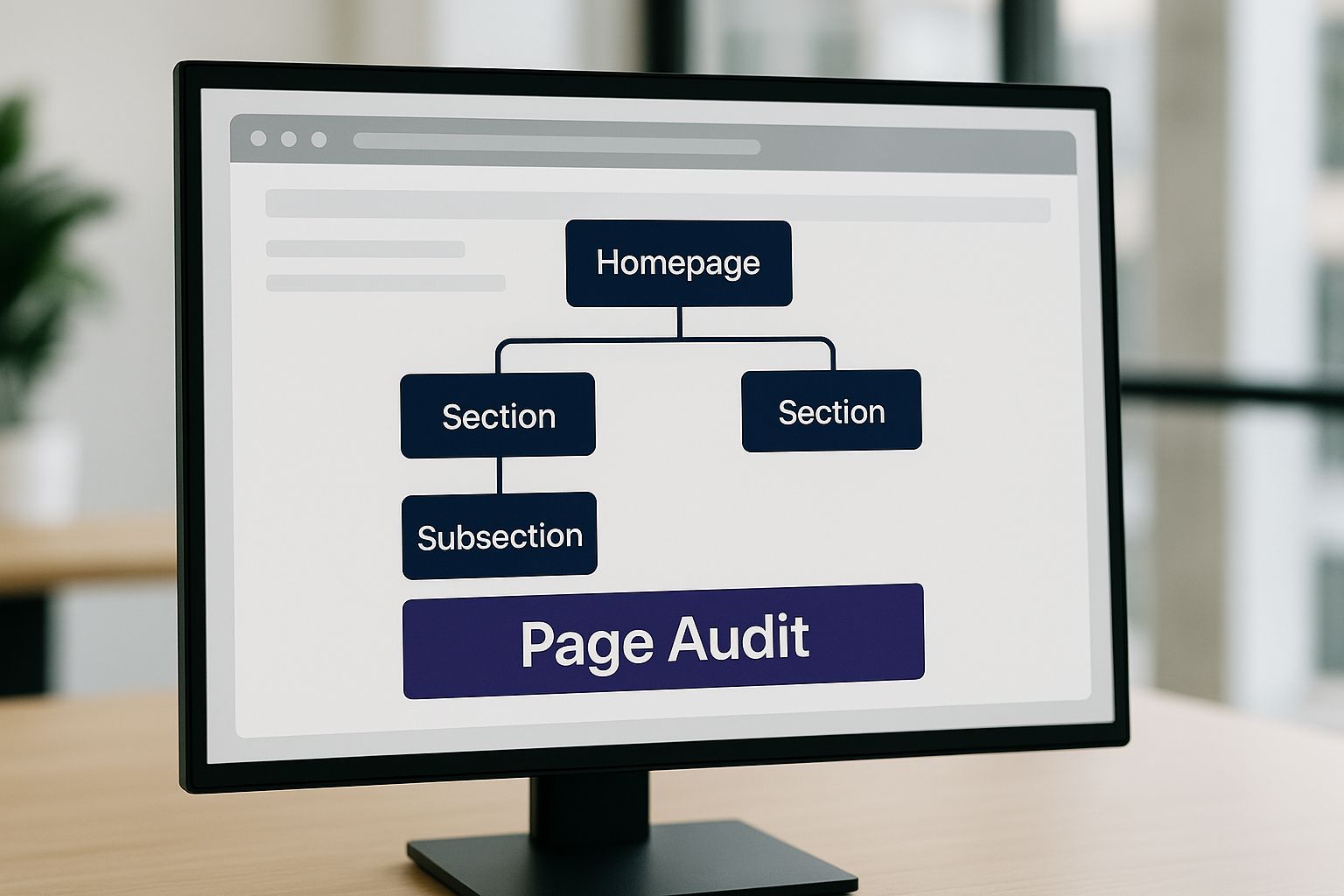Best SEO Tools for Small Businesses to Boost Growth

Diving into search engine optimization can feel a little overwhelming, but you don't need a massive budget to make a real impact. Think of the best SEO tools for small businesses as your personal digital toolkit, giving you the data you need to attract clients online without just guessing what works. Honestly, they're one of the smartest investments you can make for steady, long-term growth.
Why SEO Tools Are Your Small Business Superpower

Imagine your website is a garden. You can’t just throw some seeds in the ground and hope for the best, right? You need the right tools to help it grow. SEO tools are your digital trowels, soil testers, and watering cans—they give you the critical feedback you need to help your business really blossom online.
Without them, you're pretty much operating in the dark. You might be creating content you think clients want, but these tools show you what they're actually searching for. That shift from guesswork to a data-backed strategy is what separates the beauty businesses that thrive from those that stay hidden.
From Guesswork to Growth
The main job of an SEO tool is to swap your assumptions for insights you can actually use. Instead of wondering why your competitor is ranking higher, you can peek at their strategy and find opportunities to do even better. For a small beauty business, this means making smarter choices that directly boost your bottom line.
Here are the actionable insights these platforms give you:
- Understand your audience: Discover the exact phrases customers are typing into Google to find services like yours.
- Monitor your website’s health: Get alerts about technical glitches that hurt your rankings so you can fix them fast.
- Track your progress: See a real, measurable return on your marketing efforts and know what's working.
The demand for these insights is exploding. The combined market for SEO services and software is on track to blow past $150 billion by 2025. That’s a huge sign of just how essential these tools have become for businesses of all sizes.
Making Smart Investments
Putting money into the right SEO tools is a direct investment in your business’s future. And you don’t need to be a tech wizard to use them—many are designed with business owners like you in mind.
By giving you clear data on what’s working and what’s not, these tools help you focus your limited time and resources on the activities that actually drive results. This is the heart of effective online marketing.
At the end of the day, these platforms give you the clarity you need to compete online. They are a must-have part of any modern marketing toolkit, helping you connect with more clients and build a stronger digital presence. For more real-world advice, check out our digital marketing tips for small businesses.
Understanding the Main Categories of SEO Tools
Diving into the world of SEO tools for small businesses can feel a bit like walking into a massive hardware store when you don't even have a project in mind. It's easy to get overwhelmed. The trick is to think of these tools in four main categories, with each one designed to solve a specific problem for your business.
This approach keeps things simple and makes sure you grab the right instrument for the right job. Think of it like mapping out a marketing plan. You wouldn't just start posting randomly on Instagram, right? You’d figure out your audience, craft a message, check your tech, and then dial in on your local community. SEO tools follow that same logic, giving you a clear path to boosting your online visibility.
Keyword Research Tools: Your Treasure Map
Actionable Insight: Use these tools to find out what your potential clients are actually searching for online. They answer the million-dollar question: “What exact words are people typing into Google to find services like mine?” Using these tools helps you uncover those high-value search terms you might have never even thought of.
For example, you might learn that more people are searching for "balayage near me" than "hair highlights." With that knowledge, you can update your website’s service pages and blog posts to use the language your ideal customers are using, which brings more of the right people to your site.
On-Page SEO Tools: The Content Blueprint
Actionable Insight: Once you have your keywords, use these tools to fine-tune individual website pages so they are perfectly structured for search engines. These tools scan your content and give you a simple, actionable to-do list to improve your rankings.
Think of tools like SurferSEO or the built-in guidance you get from WordPress plugins like Rank Math. They provide clear instructions, such as:
- Add your main keyword to your page title and at least one heading.
- Improve the readability of your service descriptions.
- Ensure your images have descriptive alt text, like "brunette client with fresh balayage at sunny salon."
This infographic gives you a great visual of how a page audit—a core feature of on-page tools—fits into the bigger picture of optimizing your site.

This process is all about making sure your content isn’t just beautifully written, but also strategically built to climb those search result rankings.
To make this easier to digest, here's a quick rundown of the essential tool types every small business owner should know about.
Essential SEO Tool Types for Your Small Business
This table breaks down the core tool categories, what they do, and the key questions they help you answer. Think of it as your cheat sheet for choosing the right tool for the job.
| Tool Category | Primary Purpose | Key Questions It Answers |
|---|---|---|
| Keyword Research | Discovering the search terms your potential customers are using. | "What words are people typing into Google to find me?" |
| On-Page SEO | Optimizing your website's content and structure for search engines. | "Is my content set up to rank for my target keywords?" |
| Technical SEO | Finding and fixing foundational website issues that hurt your rankings. | "Are there any backend problems stopping Google from finding my site?" |
| Local SEO | Improving your visibility in local search results and Google Maps. | "How can I get more local clients to find my physical location?" |
By understanding these distinct roles, you can build a well-rounded toolkit that covers all your bases without paying for features you don't need.
Technical SEO Tools: The Website Health Check
Actionable Insight: Use these tools to run a health check-up for your website’s foundation. They crawl your site just like Google does and identify issues that could be hurting your rankings—things like broken links, slow page speed, or a site that doesn’t look good on a phone. A slow-loading site is a major turn-off and can make potential clients click away before they even see your beautiful work.
A technically sound website is the bedrock of any successful SEO strategy. If search engines can't easily crawl and understand your site, even the best content may go unseen.
Tools like Google Search Console (which is 100% free) and Screaming Frog are perfect for this. They flag critical errors so you can get them fixed fast, making sure you’re providing a smooth experience for both visitors and search engine bots. If you want to get familiar with a wider range of digital marketing tools, you can explore some of the various SEO tools offerings out there.
Local SEO Tools: Your Neighborhood Megaphone
Actionable Insight: If you have a physical storefront, use these tools to manage how your business shows up in local search results and on Google Maps.
These tools help ensure your business name, address, and phone number are consistent everywhere online. They also let you track your rankings in your specific service area and manage client reviews—which, as you know, are critical for building trust with local customers.
How to Choose the Right SEO Tools for Your Budget

With a million SEO tools out there, picking the right one can feel like trying to find the perfect nude lipstick from a wall of a thousand options. It's overwhelming. The key is to sidestep "shiny object syndrome"—you know, getting distracted by fancy, complicated features you'll never actually use—and just focus on what your business needs right now.
The goal is simple: find software that gives you clear, actionable insights without a massive learning curve or a scary price tag. For a small beauty business, starting with one or two powerhouse tools is way more effective than juggling a dozen confusing platforms.
Start with Your Budget
Let's be real, your budget is the first and most practical place to start. The great news? Many of the most powerful SEO tools for small businesses are either completely free or have super affordable starter plans. Your first step should be setting up Google Search Console and Google Analytics—they are non-negotiable and free.
When you start looking at paid tools, think about the return you'll get. If a $30 a month tool helps you land just one new client, it’s already paid for itself. Don't get roped into expensive annual contracts right off the bat. Instead, look for platforms that offer:
- Free trials: Test the software to see if it's easy for you to use.
- Affordable monthly plans: Choose plans that let you start small without a big commitment.
- Core features in the basic tier: Make sure the functions you really need aren't locked behind an expensive upgrade.
Prioritize Simplicity and Ease of Use
As a business owner, your time is everything. The best tool is one you'll actually use consistently. Always choose software with a clean, user-friendly dashboard over something packed with confusing charts and technical jargon. If you log in and immediately feel lost, it’s not the one for you.
An intuitive interface is more important than a long list of features. A simple tool that provides clear, actionable data will always be more valuable than a complex one that gathers digital dust.
The rise of easy-to-use website builders proves this point. Platforms like Wix now hold nearly 45% of the website builder market share, making it obvious that small businesses value simplicity above all. Many of these platforms even have SEO features built right in, which is a fantastic starting point if you're just dipping your toes in.
Plan for Future Growth
Finally, think about where your business is headed. The tool that’s perfect for you today should also be able to grow with you tomorrow. You might only need basic keyword tracking right now, but what about in a year? You might want to dive into competitor analysis or backlink monitoring.
Actionable Step: Look for a platform that lets you easily upgrade your plan as your needs become more advanced. Starting with a scalable tool saves you the massive headache of having to learn a completely new system down the road. This kind of forward-thinking is a huge part of building sustainable online marketing strategies for small businesses.
Top All-In-One SEO Platforms for Small Businesses
Ready to talk tools? I know, jumping into a big SEO platform can feel like a huge commitment. But think of the right one as your new business partner—a co-pilot guiding your marketing decisions with real, hard data instead of just guesswork.
Instead of throwing a massive list at you, I’m zeroing in on a few heavy hitters that are perfect for a small business owner who’s already wearing a dozen other hats. These platforms bundle everything you need—keyword research, a peek at your competition, and site health check-ups—into one dashboard. They're designed to give you the goods without the overwhelm.
Semrush: The Ultimate Competitor Spyglass
Semrush is often called the swiss army knife of digital marketing, and honestly, that’s a pretty perfect description. It packs a powerful suite of SEO tools for small businesses, but where it really shines is in its competitor analysis. Actionable Insight: Use it to see which keywords your local rivals are ranking for, giving you a crystal-clear roadmap for your own content.
The dashboard is surprisingly clean and easy to get around. For your beauty business, this means you can quickly find out if that salon down the street is getting tons of traffic from terms like "lash lift and tint" or "organic facials," helping you spot golden opportunities they might be missing.
- Best For: Business owners who want an all-around powerhouse with a special talent for figuring out what the competition is up to.
- Key Features: Deep keyword research, powerful competitor analysis, and a super user-friendly Site Audit tool to sniff out technical glitches.
- Pricing: There’s a limited free plan to get your feet wet. Paid plans start around $139.95/month, but I always recommend taking the free trial for a spin first to make sure it clicks with you.
Ahrefs: The Backlink Powerhouse
Ahrefs is another giant in the SEO world, and it’s famous for having one of the best backlink databases on the entire internet. What are backlinks? Think of them as votes of confidence from other websites. They’re a huge factor in how Google ranks you. Actionable Insight: Use Ahrefs to discover who is linking to your competitors so you can target those same opportunities.
Imagine discovering that a popular local beauty blogger wrote about your main competitor. With that single piece of intel, you could reach out to that same blogger, build a relationship, and maybe earn a valuable link for your own site. It can feel a bit more technical than Semrush, but its "Site Explorer" feature is an incredible asset for growth.
- Best For: Businesses ready to build their website's authority by understanding and earning high-quality backlinks.
- Key Features: Best-in-class backlink analysis, robust keyword research, and a Site Audit tool that gives you clear, actionable fixes.
- Pricing: Starts with a limited free toolset. The "Lite" plan kicks off at around $129/month and offers more than enough power for a growing business.
Quick reality check: The goal isn't to subscribe to everything. It's to find one platform that aligns with your main goal—whether that's spying on competitors or building links—and truly master it. A single tool you use consistently will always beat five tools you barely touch.
Comparison of Top SEO Tools for Small Businesses
Choosing between platforms like Semrush and Ahrefs can feel tough since they both offer so much. This table breaks down the key differences to help you see which one might be a better fit for your beauty business's immediate needs.
| Tool | Best For | Key Features | Pricing Tier |
|---|---|---|---|
| Semrush | Competitor Analysis. Great for all-around SEO with a focus on seeing what your rivals are doing to win. | Keyword Research, Competitor Spy Tools, Site Audit, Content Marketing Toolkit. | Starts at $139.95/month. Free trial available. |
| Ahrefs | Backlink Building. The gold standard for understanding who links to you (and your competitors) and why. | Backlink Analysis, Site Explorer, Keyword Explorer, Site Audit. | Starts at $129/month. Limited free tools available. |
Ultimately, both are fantastic investments. Semrush often feels a bit more intuitive for beginners, while Ahrefs provides unparalleled depth for anyone serious about building their site's authority through links.
The Non-Negotiable Free Tools
Before you even think about opening your wallet, there are two tools you absolutely must have set up. They are completely free and give you foundational data straight from the source: Google itself.
-
Google Search Console (GSC): This is your direct line of communication with Google. GSC shows you exactly how Google sees your site, which keywords people are actually using to find you, and if there are any technical errors holding you back. This is non-negotiable for any website owner. Seriously.
-
Google Analytics (GA): This tool tells you what happens after someone clicks on your site. You can see which pages are the most popular, how long visitors are sticking around, and where your traffic is coming from. Pairing GSC with GA gives you the complete 360-degree view of your online performance.
Putting Your SEO Tools into Action
Alright, theory is one thing, but making your SEO tools actually work for you is where the magic happens. This is the moment you close the gap between owning the software and seeing real, tangible results for your beauty business. It all starts with a few foundational steps that are way simpler than they sound.
The very first move is connecting your website to Google's free tools. Honestly, this isn't optional; it's the bedrock of a solid SEO strategy. Setting up Google Analytics and Google Search Console gives you a direct line of sight into how both visitors and search engines are interacting with your site.
Getting Connected to Google
Your First Actionable Step: Get the Google Analytics tracking code onto your website. Think of this code as a tiny digital receptionist that notes how every visitor found you and which pages they viewed. You'll find this code in your Google Analytics account settings—just copy it and paste it into the designated field in your website's backend settings.
Your Second Actionable Step: Verify your site with Google Search Console. This proves to Google that you own your website, unlocking a treasure trove of data. The platform will walk you through a simple verification process. Once you're in, you'll get crucial insights into which keywords are bringing people to your site and get alerts for any technical errors that need fixing.
This screenshot shows an example of a well-designed GoHappyBeauty homepage that's ready for all this tracking.
Once your tracking codes are live, data from pages just like this one will start pouring into your analytics dashboards.
From Keywords to Content Creation
With your foundational tools all connected, it’s time to put that keyword research into practice. This is how you create content that doesn't just look pretty but actively attracts new clients. The goal is to turn that list of words into a strategic content plan that gets you booked.
Here’s a simple, step-by-step process to turn your research into results:
- Export Your Keyword List: Use your chosen tool (like Semrush or Ahrefs) to find relevant terms for your services and export them into a simple spreadsheet.
- Group by Intent: Organize those keywords into logical groups. For instance, terms like "balayage near me" and "local highlights specialist" clearly belong on your main service page.
- Plan Your Content: Use question-based keywords like "how to care for salon color" to outline your next blog post. These topics directly answer your clients' biggest questions and build your authority. You can find more inspiration in our guide to hair salon marketing ideas.
The most effective content strategies are born from data. By using a keyword research tool to guide your service pages and blog posts, you ensure every piece of content you create has a built-in audience just waiting to find it.
After you've identified your topics, the next step is actually creating the content. If you want to work more efficiently, it's worth exploring how you can start scaling content creation with AI. By following these practical steps, you’ll transform your SEO tools from passive dashboards into active growth engines for your business.
A Few Common Questions About SEO Tools
Diving into the world of SEO tools for small businesses can feel a bit overwhelming, and it's totally normal to have questions about where to put your time and money. Let's clear up some of the most common ones so you can move forward with confidence.
Do I Really Need to Pay for SEO Tools?
This is the big one, right? While fantastic free tools like Google Search Console are non-negotiable essentials, paid tools give you a serious competitive edge. They unlock a much deeper level of data, sneak peeks into what your competitors are doing, and time-saving automations that free versions just can't touch.
Think of it like this: a small monthly investment in a quality tool can bring a huge return by uncovering those golden-ticket keywords and tracking your growth with a precision that makes every decision smarter. It’s an investment in efficiency and insight.
How Long Until I Actually See Results?
Ah, the million-dollar question. SEO is definitely a marathon, not a sprint. While the tools give you data right away, it can take a solid 3 to 6 months to see a real shift in your rankings after you start putting their insights into action.
Why? Because search engines need time to crawl, index, and re-evaluate your site based on the changes you've made. Consistency is your best friend here. Using your tools regularly to check in, monitor your progress, and make ongoing tweaks is what builds that sustainable, long-term growth for your beauty biz.
What Is the Most Important Tool for a Local Business?
For any local business, your most critical free tool is your Google Business Profile (GBP). You can manage it right from Google Search and Maps, and for local search visibility, it's an absolute must-have.
Beyond that, a tool that helps you with local rank tracking and citation management is incredibly valuable. Many all-in-one platforms have these features built-in. The main goal is to make sure your business name, address, and phone number are spot-on accurate everywhere online, so customers searching for services "near me" can find you without a hitch.
It's also super important to remember that how people search is always changing. Optimizing for mobile and voice search isn't just a trend anymore—it's how modern clients find local services.
Mobile devices now drive over 63% of all global web traffic, but only 11% of webpages actually rank the same on desktop and mobile. On top of that, about 20.5% of people worldwide use voice search, which is all about conversational, question-based keywords like, "what's the best salon for balayage?" Small businesses that get ahead of this by focusing on mobile speed and natural language will have a huge advantage. You can read more about these game-changing SEO statistics and trends to stay ahead of the curve.
Ready to build a stunning website that's already optimized to get you found online? At GoHappyBeauty, we create beautiful, SEO-ready websites designed specifically for beauty professionals like you. Start building your dream website with us today!
Grow your beauty business
Our focus is, and always will be, helping you improve your online presence and generate more business from your website. That is what we do, for you.

